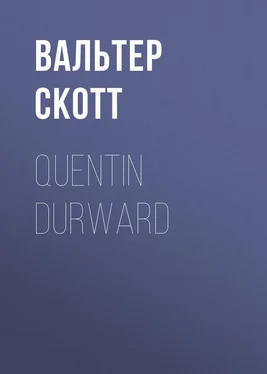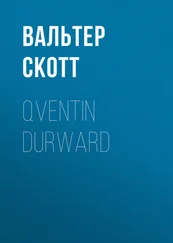Вальтер Скотт - Quentin Durward
Здесь есть возможность читать онлайн «Вальтер Скотт - Quentin Durward» — ознакомительный отрывок электронной книги совершенно бесплатно, а после прочтения отрывка купить полную версию. В некоторых случаях можно слушать аудио, скачать через торрент в формате fb2 и присутствует краткое содержание. Жанр: foreign_antique, foreign_prose, Альтернативная история, на английском языке. Описание произведения, (предисловие) а так же отзывы посетителей доступны на портале библиотеки ЛибКат.
- Название:Quentin Durward
- Автор:
- Жанр:
- Год:неизвестен
- ISBN:нет данных
- Рейтинг книги:3 / 5. Голосов: 1
-
Избранное:Добавить в избранное
- Отзывы:
-
Ваша оценка:
- 60
- 1
- 2
- 3
- 4
- 5
Quentin Durward: краткое содержание, описание и аннотация
Предлагаем к чтению аннотацию, описание, краткое содержание или предисловие (зависит от того, что написал сам автор книги «Quentin Durward»). Если вы не нашли необходимую информацию о книге — напишите в комментариях, мы постараемся отыскать её.
Quentin Durward — читать онлайн ознакомительный отрывок
Ниже представлен текст книги, разбитый по страницам. Система сохранения места последней прочитанной страницы, позволяет с удобством читать онлайн бесплатно книгу «Quentin Durward», без необходимости каждый раз заново искать на чём Вы остановились. Поставьте закладку, и сможете в любой момент перейти на страницу, на которой закончили чтение.
Интервал:
Закладка:
Durward was mortified and surprised at the consequence of his precipitance, but comforted himself with the hope that the Lady of the Lute could neither easily forego the practice of an instrument which seemed so familiar to her, nor cruelly resolve to renounce the pleasures of fresh air and an open window for the churlish purpose of preserving for her own exclusive ear the sweet sounds which she created. There came, perhaps, a little feeling of personal vanity to mingle with these consolatory reflections. If, as he shrewdly suspected, there was a beautiful dark tressed damsel inhabitant of the one turret, he could not but be conscious that a handsome, young, roving, bright locked gallant, a cavalier of fortune, was the tenant of the other; and romances, those prudent instructors, had taught his youth that if damsels were shy, they were yet neither void of interest nor of curiosity in their neighbours’ affairs.
Whilst Quentin was engaged in these sage reflections, a sort of attendant or chamberlain of the inn informed him that a cavalier desired to speak with him below.
CHAPTER V: THE MAN AT ARMS
Full of strange oaths, and bearded like the pard,
Seeking the bubble reputation
Even in the cannon’s mouth.
The cavalier who awaited Quentin Durward’s descent into the apartment where he had breakfasted, was one of those of whom Louis XI had long since said that they held in their hands the fortune of France, as to them were intrusted the direct custody and protection of the royal person.
Charles the Sixth had instituted this celebrated body, the Archers, as they were called, of the Scottish Bodyguard, with better reason than can generally be alleged for establishing round the throne a guard of foreign and mercenary troops. The divisions which tore from his side more than half of France, together with the wavering and uncertain faith of the nobility who yet acknowledged his cause, rendered it impolitic and unsafe to commit his personal safety to their keeping. The Scottish nation was the hereditary enemy of the English, and the ancient, and, as it seemed, the natural allies of France. They were poor, courageous, faithful; their ranks were sure to be supplied from the superabundant population of their own country, than which none in Europe sent forth more or bolder adventurers. Their high claims of descent, too, gave them a good title to approach the person of a monarch more closely than other troops, while the comparative smallness of their numbers prevented the possibility of their mutinying, and becoming masters where they ought to be servants.
On the other hand, the French monarchs made it their policy to conciliate the affections of this select band of foreigners, by allowing them honorary privileges and ample pay, which last most of them disposed of with military profusion in supporting their supposed rank. Each of them ranked as a gentleman in place and honour; and their near approach to the King’s person gave them dignity in their own eyes, as well as importance in those of the nation of France. They were sumptuously armed, equipped, and mounted; and each was entitled to allowance for a squire, a valet, a page; and two yeomen, one of whom was termed coutelier, from the large knife which he wore to dispatch those whom in the melee his master had thrown to the ground. With these followers, and a corresponding equipage, an Archer of the Scottish Guard was a person of quality and importance; and vacancies being generally filled up by those who had been trained in the service as pages or valets, the cadets of the best Scottish families were often sent to serve under some friend and relation in those capacities, until a chance of preferment should occur.
The coutelier and his companion, not being noble or capable of this promotion, were recruited from persons of inferior quality; but as their pay and appointments were excellent, their masters were easily able to select from among their wandering countrymen the strongest and most courageous to wait upon them in these capacities.
Ludovic Lesly, or as we shall more frequently call him, Le Balafre, by which name he was generally known in France, was upwards of six feet high, robust, strongly compacted in person, and hard favoured in countenance, which latter attribute was much increased by a large and ghastly scar, which, beginning on his forehead, and narrowly missing his right eye, had laid bare the cheek bone, and descended from thence almost to the tip of his ear, exhibiting a deep seam, which was sometimes scarlet, sometimes purple, sometimes blue, and sometimes approaching to black; but always hideous, because at variance with the complexion of the face in whatever state it chanced to be, whether agitated or still, flushed with unusual passion, or in its ordinary state of weather-beaten and sunburnt swarthiness.
His dress and arms were splendid. He wore his national bonnet, crested with a tuft of feathers, and with a Virgin Mary of massive silver for a brooch. These brooches had been presented to the Scottish Guard, in consequence of the King, in one of his fits of superstitions piety, having devoted the swords of his guard to the service of the Holy Virgin, and, as some say, carried the matter so far as to draw out a commission to Our Lady as their Captain General. The Archer’s gorget, arm pieces, and gauntlets, were of the finest steel, curiously inlaid with silver, and his hauberk, or shirt of mail, was as clear and bright as the frostwork of a winter morning upon fern or brier. He wore a loose surcoat or cassock of rich blue velvet, open at the sides like that of a herald, with a large white St. Andrew’s cross of embroidered silver bisecting it both before and behind; his knees and legs were protected by hose of mail and shoes of steel; a broad, strong poniard (called the Mercy of God), hung by his right side; the baldric for his two handed sword, richly embroidered, hung upon his left shoulder; but for convenience he at present carried in his hand that unwieldy weapon which the rules of his service forbade him to lay aside.
[St. Andrew was the first called to apostleship. He made many converts to Christianity and was finally crucified on a cross of peculiar form, which has since been called the St. Andrew’s cross. Certain of his relics were brought to Scotland in the fourth century, and he has since that time been honoured as the patron saint of that country. He is also the patron saint of the Burgundian Order, the Golden Fleece.]
Quentin Durward – though, like the Scottish youth of the period, he had been early taught to look upon arms and war – thought he had never seen a more martial looking, or more completely equipped and accomplished man at arms than now saluted him in the person of his mother’s brother, called Ludovic with the Scar, or Le Balafre; yet he could not but shrink a little from the grim expression of his countenance, while, with its rough moustaches, he brushed first the one and then the other cheek of his kinsman, welcomed his nephew to France, and, in the same breath, asked what news from Scotland.
“Little good tidings, dear uncle,” replied young Durward; “but I am glad that you know me so readily.”
“I would have known thee, boy, in the landes of Bourdeaux, had I met thee marching there like a crane on a pair of stilts [the crutches or stilts which in Scotland are used to pass rivers. They are employed by the peasantry of the country near Bordeaux to traverse those deserts of loose sand called Landes. S]. But sit thee down – sit thee down – if there is sorrow to hear of, we will have wine to make us bear it. – Ho! old Pinch Measure, our good host, bring us of thy best, and that in an instant.”
The well known sound of the Scottish French was as familiar in the taverns near Plessis as that of the Swiss French in the modern guinguettes [common inns] of Paris; and promptly – ay, with the promptitude of fear and precipitation, was it heard and obeyed. A flagon of champagne stood before them, of which the elder took a draught, while the nephew helped himself only to a moderate sip to acknowledge his uncle’s courtesy, saying, in excuse, that he had already drunk wine that morning.
Читать дальшеИнтервал:
Закладка:
Похожие книги на «Quentin Durward»
Представляем Вашему вниманию похожие книги на «Quentin Durward» списком для выбора. Мы отобрали схожую по названию и смыслу литературу в надежде предоставить читателям больше вариантов отыскать новые, интересные, ещё непрочитанные произведения.
Обсуждение, отзывы о книге «Quentin Durward» и просто собственные мнения читателей. Оставьте ваши комментарии, напишите, что Вы думаете о произведении, его смысле или главных героях. Укажите что конкретно понравилось, а что нет, и почему Вы так считаете.












